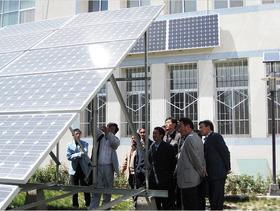Climate Change Mitigation through Low Carbon Compound Projects in Jiangsu’s Cities

The project directly assists with achieving the energy efficiency and climate change mitigation targets for Jiangsu Province by imparting specialist and contextual knowledge to those responsible for energy planning in urban areas and in industry and empowering them to implement integrated measures.
Context
Based on interim results, Jiangsu Province has so far failed to meet expectations in terms of achieving the energy efficiency and greenhouse gas reduction targets set out in the current 12th Five-Year Plan for 2011 to 2015. Consequently, urgent efforts are being made to find innovative solutions in this area, especially since the 13th Five-Year Plan contains even stricter objectives. It requires a 45 to 48 percent reduction in the intensity of carbon emissions by 2020 relative to 2005.
Jiangsu's cities have very good political conditions for developing into low-carbon cities. Energy efficiency has been identified as the most cost-effective and climate-friendly low-carbon strategy. There are also plans to incorporate unconventional, decentralised and renewable energy sources into the province's energy supply by using integrated energy strategies for buildings, urban districts, enterprises and industrial estates.
Those responsible for energy planning are under tremendous pressure to achieve the political objectives despite having only limited knowledge of how to develop systemic solutions and put them into practice.
Approach
The project directly assists with achieving the energy efficiency and climate change mitigation targets for Jiangsu Province by imparting specialist and contextual knowledge to those responsible for energy planning in urban areas and in industry and empowering them to implement integrated measures.
The project objective will be achieved through the following measures:
- Drafting of replicable strategies for the holistic planning of complex compound energy systems;
- Identification of pilot projects and provision of support for planning and implementing compound systems in several development stages;
- Activities to develop the capacity of key actors in cities and industry (members of low-carbon working groups, for instance) to put integrated energy strategies into effect.
Gradually introducing holistic compound systems generates positive lock-in effects, ensuring that infrastructure remains cost-effective, energy efficient and environmentally friendly throughout its lifespan.
The effectiveness of the climate change mitigation measures is safeguarded through an approach that combines political objectives, target-group interests, inclusive transfer of German expertise, collaboration with low-carbon working groups and the essential involvement of the private sector. Bringing multipliers on board and using targeted dissemination activities ensures that measures can be replicated. To set a peak level for greenhouse gas emissions up to 2030 and helps to raise the political pressure to succeed.
The project results will be available for use by other cities in Jiangsu Province and beyond, especially provinces with a similar climate characterised by hot summers and cold winters. The project has good work contacts in other Chinese cities such as Shanghai, provinces such as Guangdong, Anhui, Shandong and Henan, and autonomous regions such as Ningxia and Xinjiang. Apart from NDRC, the partner organisations are the Ministry of Housing and Urban-Rural Development (MOHURD) and the Ministry of Commerce (MOFCOM). They help to disseminate the work results and facilitate the application of the planning strategies beyond the project's immediate sphere of influence.
Characteristics
Duration
-
Countries
- China
Regions
- Asia
Topics
- Tackling climate change
- Reducing GHG emissions